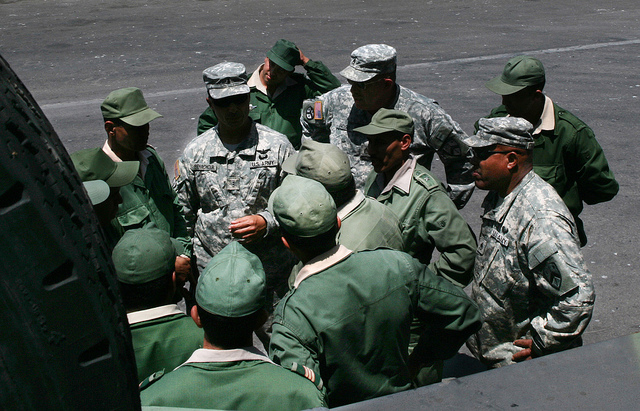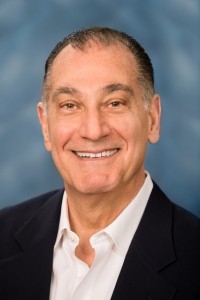Updated
Is Morocco a Serious Partner of the US? — Ambassador Edward M. Gabriel (ret.)

AFRICAN LION 10 – Tennessee National Guardsmen Provide Heavy Equipment Transport System Familiarization Course Photo: US Army Africa
Ambassador Edward M. Gabriel (ret.)
July 16, 2018
 For the past twenty years I have been involved with Morocco, first as US Ambassador, from 1997-2001, and, until my resignation last October, as an adviser for most of the past two decades. The most frequently asked questions of me by US policymakers over the years has been whether Morocco is truly serious about reform and change, and whether it is willing to take the risks necessary to be a close partner.
For the past twenty years I have been involved with Morocco, first as US Ambassador, from 1997-2001, and, until my resignation last October, as an adviser for most of the past two decades. The most frequently asked questions of me by US policymakers over the years has been whether Morocco is truly serious about reform and change, and whether it is willing to take the risks necessary to be a close partner.
On the question of whether Morocco is serious about reform, after 20 years of watching it happen, I generally tell people they are asking the wrong question. The real question should be about its pace and limits. Are they moving too slowly to sustain the momentum, or so fast that they risk a backlash from more conservative elements in the society? And, is there a limit on the reform process?
The question of whether Morocco is serious about reform appears to question US trust of Morocco’s intentions and sincerity. Rather, if the question assumes sincerity on Morocco’s part towards change, which their record substantiates, then the logical question should be, “how can we help?”.
This is not due to any one Administration’s action, but rather a view of Morocco by the US in the post-Cold War era that it is no longer a top tier country of importance to its interests. For the past three decades, following the Cold War, Morocco has continued to assume that after two centuries of unfailing support and friendship, a close, strategic relationship was still in the US interest.
Strong bilateral relationships, however, require constant care and feeding on issues of common interest. Trust and confidence with our strategic partners is essential if we are to expect them to be willing to take risks with and for us, and that also requires that we are willing to take risks with and for them. This is the kind of relationship that both countries had during the Cold War and during the most important moments of our shared history.
Before King Hassan II passed away in 1999, he understood the changing post-Cold War environment and the new role America would assume in a singular superpower world that it dominated. He knew that Morocco’s leadership would have to change and modernize if it were to survive and create a future for its people in the 21st Century. He believed that our common values of openness, tolerance, liberty and rule of law, combined with strong military and security ties, would need to evolve and be strengthened to bind the two countries in this new era. At the same time, he was cautious in reflecting on the sometime short term US foreign policy views and how that can affect its commitments to its friends by opining that “America has a short memory”.
King Mohammed VI accelerated these views, offering a new strategic partnership in military, security and political matters with the US. In 2000, he announced with then Secretary of Defense William Cohen the Defense Cooperation Committee for the purpose of strategically aligning military objectives. Then Moroccan Minister of Foreign Affairs Mohammed Benaissa and the US Assistant Secretary of State, Ned Walker, in 2000 signed a new strategic bilateral agreement, to foster a partnership that would support a “democratic, prosperous and stable” Morocco. During this same time, a newly formed Morocco-US Business Council increased trade and investment between our two countries three fold in a few short years.
By 2003, King Mohammed had forged a new family law that would equal the playing field for women. He began his own version of the War on Poverty that would implement anti-poverty projects in 600 of the most vulnerable regions and cities in Morocco. New laws were passed regarding press freedoms, prison reform, human rights and an independent judiciary. On a number of occasions he would reinforce his country’s irreversible drive towards democracy.
There surely have been some setbacks as well such as the suppression of the media, refusal to allow international journalists in the country, and police detentions without timely judicial protections. Implementation of the constitutional reforms of 2011 has been sometimes too slow or, in some cases, non-existent. However, the evidence of reform is clear and steady, even if the question of pace and limit, in some areas, remains relevant. Just look at the State Department human rights reports past and post 1999, which is telling in its tone and reporting.
So, if America would quit being obsessed with “whether” Morocco is serious, and instead focus on the speed at which it is moving, a new and closer relationship could emerge. Morocco believes it is moving as fast as it thinks possible, in order to not destabilize the country. Institutions, people and programs take time to change, usually through generations, not years. People need to be educated and allowed to come to terms with evolving circumstances.
If the question was reframed to “how can we help you move forward?”, this would result in a more positive attitude in Morocco’s view of the US, as well as a shift in how we think about the way we support them. Rather than criticism, which depends on policy and program sticks to encourage forward progress, programmatic carrots that encourage reform and a long term predictable partnership would bear more fruit. If there is one thing we learned from Iraq, it’s that forcing change on a people who didn’t ask for it will not work. Indeed, there are countries who are moving forward on their own, without prodding, and could use a supportive, helping hand, and Morocco is one such example.
Regarding the second question on whether Morocco and the US are willing to take risks in support of their primary interests, both countries get a failing grade. Both want the other to take strategic risks for their own self-interests, but neither seems willing to take the first step to help the other.
For Morocco, it’s simple: unless we are willing to protect and support Morocco’s most vital interest, the Western Sahara, there will be gaps in an otherwise close and inter-dependent relationship. And unless Morocco is willing to take risks in America’s interest, and support UN resolutions, relations with Israel and other regional concerns, America won’t take it seriously and will consider it a second tier country; a good friend but not a strategic partner.
The solution is somewhat simple: by changing the first question to ask how we can help them move to achieve their reform goals, it’s clear that they’ll be more interested in taking risks for the US, and this can lead to a very important strategic relationship.